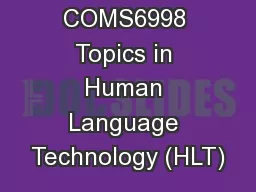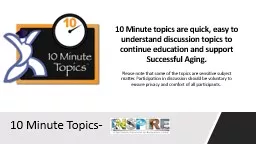PDF-Special Topics in History:
Author : test | Published Date : 2016-08-17
Fall 2013 1 HIST 58 5 004 cross listed with ANT 585 002 MESAS 570 00 0 Topic Un archived Histories Instructor Days Times Maximum Enrollment Pandey TH 100
Presentation Embed Code
Download Presentation
Download Presentation The PPT/PDF document "Special Topics in History:" is the property of its rightful owner. Permission is granted to download and print the materials on this website for personal, non-commercial use only, and to display it on your personal computer provided you do not modify the materials and that you retain all copyright notices contained in the materials. By downloading content from our website, you accept the terms of this agreement.
Special Topics in History:: Transcript
Fall 2013 1 HIST 58 5 004 cross listed with ANT 585 002 MESAS 570 00 0 Topic Un archived Histories Instructor Days Times Maximum Enrollment Pandey TH 100 x2013 4 00 pm. 897 Special Topics in Cryptography Instructors Ran Canetti and Ron Rivest Lecture 25 PairingBased Cryptography May 5 2004 Scribe Ben Adida 1 Introduction The 64257eld of PairingBased Cryptography has exploded The new topics which have been selected based on recommendations from our users are Construction Law Contracts Intellectual Property including Information Technology Motor Vehicles Revised Constitutional Law eDigest We will be modifying the Const HM Fluid Mechanics M 6 Vectors C 6 Chemical Kinetics Nuclear Surface Chemistry P 7 Gravitation Properties of Matter M 7 3D Geometry C 7 GOC P 8 Ray optics M 8 Straight Line C 8 Isomerism P 9 Wave Optics Diffraction Polarisation Optical Instruments Whedon. Dr. David Lavery. Fall 2014. PH 308, M 600-900. Special Topics in Film Studies: Joss . Whedon. Special Topics in Film Studies: Joss . Whedon. Special Topics in Film Studies: Joss . Whedon. . Whedon. Joss . Whedon. , Auteur. There’s a lot of very . very. beautiful footage from myself, the great auteur. I can actually make a very expensive location look as though we are shooting in front of a black curtain. A lot of your hack directors can’t do that.. Whedon. Dr. David Lavery. Fall 2014. PH 308, M 600-900. . Special Topics in Film Studies: Joss . Whedon. Not Making . Wonder Woman. William Moulton . Marston (1893-1947). . Special Topics in Film Studies: Joss . AQA . b unit 4. Aim – be able to discuss at least two topics in relation to each debate . Success criteria: . Use evidence to support your arguments . Be aware of the real-life implications within the debates in relation to different topics . Whedon. Dr. David Lavery. Fall 2014. PH . 308, . M 600-900. Special Topics in Film Studies: Joss . Whedon. . Buffy . as a Cult TV Show. Special Topics in Film Studies: Joss . Whedon. . Buffy . as a Cult TV Show. Whedon. Dr. David Lavery. Fall 2014. PH 308, M 600-900. . Firefly. Episodes. Special Topics in Film Studies: Joss . Whedon. Joss Whedon on the Set of . Firefly. Special Topics in Film Studies: Joss . Dr. David Lavery, Fall 2016. Entities and Groups. Special Topics in Popular Culture, Fall 2016. Brotherhood without Banners. Special Topics in Popular Culture, Fall 2016. Children of the Forest. Special Topics in Popular Culture, Fall 2016. . Kenneth Church. Kenneth.Ward.Church@gmail.com. http://www.columbia.edu/~kc3109/. . Sept 9, 2017. 1. Topics in HLT. Too many papers are boring. Survey . papers. (and . most conference . papers). tend . AFOLABI ADEKAIYAOJA. Overview. Basics. Recruitment. Pitching. Structure/Setup. Materials. Potential Challenges. Questions. Basics. The . UN- Bodies, Councils, Committees, History and General Facts. The Rules of Procedure/Debating Style. Students in the Auto & EE OPTIONS should enroll in the option related 'flavor' Aero Auto Bio EE Term Offered MECE-348 Cont Issues in Energy and Environment X X X FA/SP MECE-348 Cont Issues in Automoti Please note that some of the topics are sensitive subject matter. Participation in discussion should be voluntary to ensure privacy and comfort of all participants. . Forgiveness. “Forgiveness does not change the past, but it does enlarge the future.”.
Download Document
Here is the link to download the presentation.
"Special Topics in History:"The content belongs to its owner. You may download and print it for personal use, without modification, and keep all copyright notices. By downloading, you agree to these terms.
Related Documents














